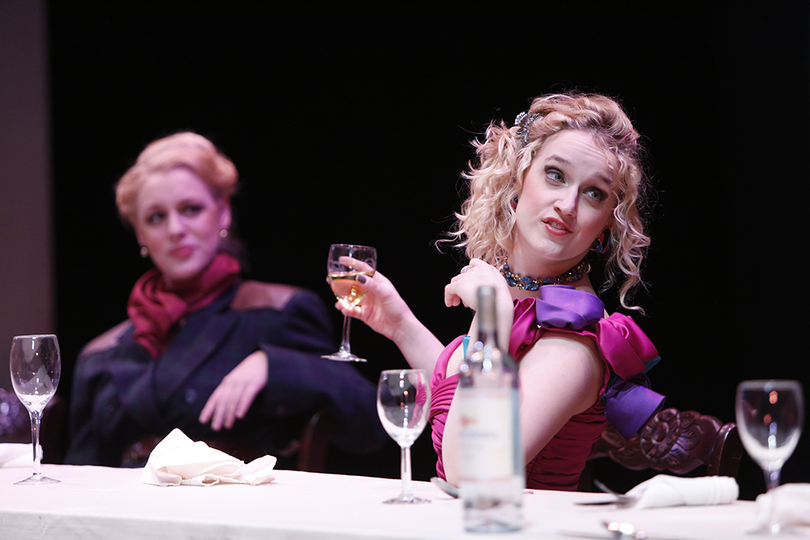SU Drama’s ‘Top Girls’ tackles difficult issues through performance of talented cast

Mary Ann Pianka plays Marlene, a character struggling with herself after finding unlikely success as a woman in the SU Drama production of "Top Girls." The show deals with issues of overcoming gender social norms. Sam Maller | Asst. Photo Editor
If we’ve taken anything away from the last century, it is that repressed groups will rise above their oppressors.
During the last half of the century, women have made their voices heard, gaining more rights and independence, and entering the workforce. As the women in “Top Girls” took their seats at a table reminiscent of The Last Supper, they raised their glasses and toasted to womanhood and its splendor, affirming the feeling of achievement.
The current production of the Syracuse University drama department, “Top Girls” wittily and poignantly shows the power and pitfalls of being a woman in a male-driven society, and grappling with what womanhood is truly about. Anchored by a gifted group of young actresses, the play runs through Feb. 24.
Shown in three acts, “Top Girls” tells the story of Marlene, a career-driven British woman who feels unfulfilled by her life, despite successfully overcoming the gender gap. As the show goes in backward-chronological order, the audience is forced to not only pay close attention to the subtle nuances exhibited by the women in each scene, but to also constantly ask questions. How did Marlene end up the way she did? What caused her to lose sight of personal life in favor of a career? In the end, the audience finds answers, which are grittier than some might expect.
Written by Caryl Churchill, a majority of “Top Girls” examines the important moment in British history when Margaret Thatcher paved the way for women to professionally stand on their own. Still the only female British Prime Minister to date, Thatcher fought tirelessly to open the gateway for female employment.
Churchill’s work reflects the hunger Thatcher instilled in women from the late 70s to the early 90s. One scene in particular, between Marlene and a low-ranking employee in her company, portrays this message. Marlene reveals her determination to get rid of the perception of women as naturally emotional and that they will abandon themselves for men.
One of the most important characteristics Churchill likely intended for Marlene was that there was always something bubbling beneath the surface, besides her drive for work. When she was at work, she questioned why she fought so hard to get there. Later in the play, when she visited her family, she grappled with the idea of actually “having it all.”
Directed by Timothy Davis-Reed, the play suffers from pacing throughout the performance. With a play as long as “Top Girls,” the pacing of each scene needs to be strong and move along rather than lag. For example, in Act One’s dinner party scene, when the women are talking and screaming over one another, the pacing doesn’t quite work. While it was meant to prove women want their voices to be heard, the execution caused a cacophony, and the initial interest in the scene was compromised.
What almost stole the show was the beautifully illustrated background the play was set against, which varied from an English cottage yard to an architectural blueprint design of scenic London. Acting as a window to the world outside of Churchill’s words, it reminded the audience of life beyond the women’s movement.
Actress Mary Ann Pianka triumphs as the complicated Marlene. After moving past some initial difficulties with the British accent, she owned the stage by the end of the first act.
Pianka’s portrayal of a painfully emotional journey in “Top Girls” reminds the audience that women are still struggling with equality.
Unforgettable supporting player Sumiko Cohen shows advanced comedic chops that made for the show’s biggest laughs. Dry and brilliantly timed, she kept the audience captivated by her every word.
For those looking for a light and fluffy theatre experience, “Top Girls” will surely disappoint, but the substance-induced show doesn’t apologize for giving the audience a slice of truth.




